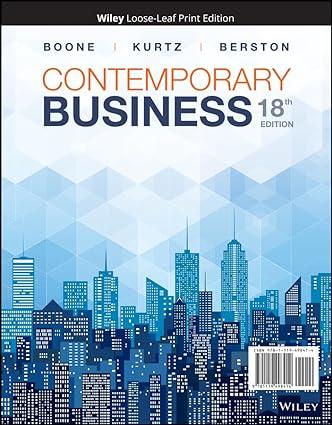The Internet of Things (IoT), as discussed in Chapter 14, has blurred the line between products and
Question:
The Internet of Things (IoT), as discussed in Chapter 14, has blurred the line between products and services - and, as a result, taxes. The issue is how companies are taxed, because products are taxed differently than services. To add to the confusion, if what a company sells is classified as "telecommunications," then it is taxed as a regulated utility. It is estimated that in the next year, there will be 50 billion connected devices with close to $\$ 9$ trillion in revenue affected by this designation.
As cloud computing, mobile computing, and big data continue to spur the growth of the Internet of Things, businesses have capitalized on creating value from traditional products by adding Internet connectivity, sensors, and other IoT capabilities. As a result, the question persists about what is classified as a product and what is classified as a service. Take for example, refrigerators, ovens, thermostats, cars, and medical devices. The issue of taxes has become increasingly complex due mainly to recurring (and changing) revenue models.
Manufacturers of automakers, medical device makers, and appliances are adding value to their product offerings by providing connectivity services and sometimes by offering ongoing subscriptions. Is a former product company that offers a smart product with sensors now considered a service business? These are the very decisions regulatory and taxing authorities will be forced to make when evaluating companies that generaterevenue streams that now include service and communication offerings delivered over the Internet.
Generally, when a service like dry cleaning or a haircut is provided, it is taxed.
However, sometimes services are consumed over an ongoing period of time-for example, Netflix, iTunes, or Hulu. Utilities, for another example, are billed on a "pay for what you use" or consumption-based model.
The question of what constitutes a product, a service, or a high-tech bundled service has become increasingly complex. To make sure they collect the appropriate amount of tax revenues, taxing authorities are particularly interested in answering this question. Even trying to figure out what the service offering entails can be far less straightforward than in the past. For now, tax authorities will continue to rethink and figure out tax rules to make sure they receive their fair share of taxes from additional services provided via the Internet of Things.
Questions for Critical Thinking
1. Why do you think services are taxed differently than products? Is this fair? Why or why not?
2. What tax planning should a business consider if it is involved in the Internet of Things?
Step by Step Answer:

Contemporary Business
ISBN: 9781119498414
18th Edition
Authors: Louis E. Boone, David L. Kurtz, Susan Berston





